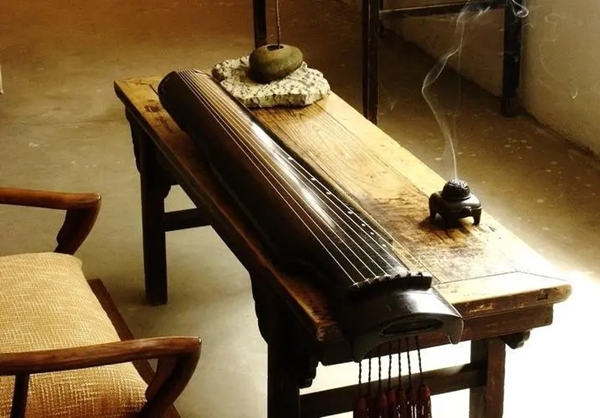What is the meaning of "sand sound" in guqin
689 views · Organized by 咖喱麦兜 on 2022-06-13
I often hear people say that this qin has a sandy sound. What does the "sandy sound" of the guqin mean?

The "sand" is the hoarse noise that appears under the strings when pressing. There are only two situations in which "sand sounds" appear. One is that the top of the piano is uneven, and the other is that the strings have knots. The unevenness of the piano panel is generally caused by the deformation of the panel or the bulging of the broken lines or the peeling of the paint tire. Knots on strings are smaller bumps (nimples) on top of the strings. The string summary is easy to handle, just change the string. The deformation of the surface of the piano is more troublesome. If the deformation is slight, a small wooden strip such as a toothpick can generally be placed at the Longgu or Yueshan to increase the height of the strings. If you still can't solve the problem, you need to find a violinist to repair it.
Involving musical instruments
Guqin (pinyin: Gǔ Qín) is a traditional Chinese musical instrument with a history of at least 3,500 years. Guqin is also known as Yaoqin, Yuqin and Seven-stringed Qin. The guqin has 13 emblems that mark the rhythm, and is also a ritual and musical instrument. It belongs to the silk in the octave. Guqin has a wide range, deep timbre and long aftertone.
Guess you like
Organized by 未知领地 on 2024-03-17
When selecting a guqin, the timbre quality is often the primary criterion to judge its quality, because the timbre is not only related to the artistic expression of the guqin, but also deeply rooted in the unique pursuit of music aesthetics in traditional Chinese culture. Here are some basic timbre elements to consider when choosing a guqin.
read >>
Organized by 卷鹅 on 2024-03-14
With the arrival of the hot summer, for the guqin friends, how to do a good job in the hot and humid season of guqin maintenance is particularly important. Guqin as a traditional Chinese wooden chord instrument, its material is very sensitive to changes in temperature and humidity, so the correct maintenance of guqin in summer can not only extend the life of the instrument, but also maintain its pure timbre.
read >>
Organized by 雨童 on 2024-03-14
Guqin, as an ancient and rich cultural instrument in China, its playing techniques pay attention to the integration of body and mind, rhythm and emotion. In the process of learning Guqin, there is a set of sixteen words that condense the wisdom of countless piano players. They are: "Light, loose, slow, even, Tian, light, elegant, beautiful, bright, mining, quiet, far, ancient, clumsy, middle, and".
read >>
Organized by 迦夜 on 2024-03-13
Guqin, as one of the oldest plucked instruments in China, the beauty of its rhyme lies not only in the pleasant tone, but also in whether it can pop out the kind of "ancient flavor" that has traversed thousands of years.
read >>
Organized by 梦昱 on 2024-03-13
In the pursuit of Guqin skills on the road, many qin friends may encounter such a problem: despite putting in a lot of time and energy to practice hard, but the pace of progress does not seem to be as obvious as expected. This phenomenon not only dampened the enthusiasm of learners, but also triggered deep thinking on the way to improve guqin skills.
read >>

 渝公网安备 50010702504639号
渝公网安备 50010702504639号